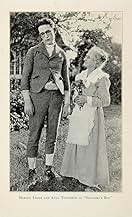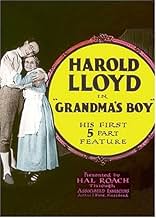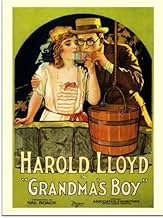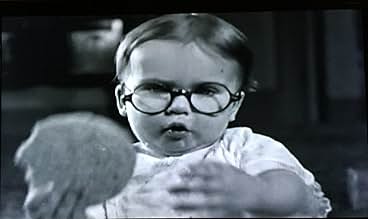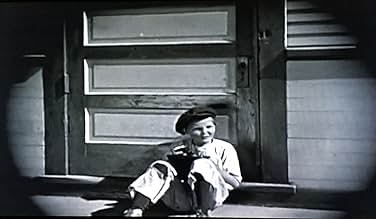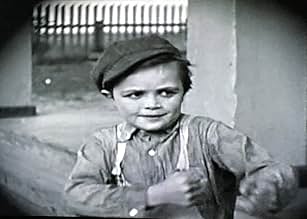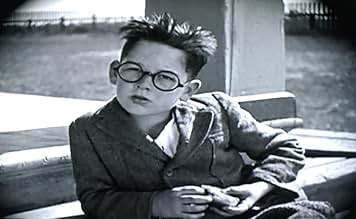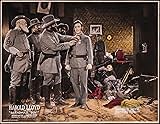VALUTAZIONE IMDb
7,0/10
2164
LA TUA VALUTAZIONE
Aggiungi una trama nella tua linguaA meek young man must find the courage within when a rogue tramp menaces his home town.A meek young man must find the courage within when a rogue tramp menaces his home town.A meek young man must find the courage within when a rogue tramp menaces his home town.
- Regia
- Sceneggiatura
- Star
- Premi
- 1 vittoria in totale
Jack Morgan
- Little Boy with Grandma
- (scene tagliate)
Roy Brooks
- Townsman
- (non citato nei titoli originali)
Sammy Brooks
- Townsman
- (non citato nei titoli originali)
Jack Edwards
- Grandma's Boy as a Baby
- (non citato nei titoli originali)
William Gillespie
- Townsman
- (non citato nei titoli originali)
- …
John Hatton
- Schoolboy Bully #1
- (non citato nei titoli originali)
Wally Howe
- The Girl's Father
- (non citato nei titoli originali)
- …
Mark Jones
- Old Hag with Talisman
- (non citato nei titoli originali)
James T. Kelley
- Townsman
- (non citato nei titoli originali)
Gus Leonard
- Farmer
- (non citato nei titoli originali)
Gaylord Lloyd
- Townsman
- (non citato nei titoli originali)
George Rowe
- Townsman
- (non citato nei titoli originali)
Recensioni in evidenza
About 20 years ago I was fortunate enough to see Harold Lloyd's first feature-length film, Grandma's Boy, at a public screening. I recall that it went over very well with the audience, that Harold was highly sympathetic in the lead role, and that I found the movie pleasant and engaging, with a stronger plot than some of Lloyd's later features. Now that I've rediscovered the film on DVD it's a pleasure to report that it holds up beautifully and, unlike some silent comedies, plays well on TV. Grandma's Boy is a richly atmospheric period piece that is sweet, funny, and suspenseful, and certainly ranks with Lloyd's best work. It's all the more impressive that this was his first attempt at a full-length feature, for it marks a genuine stylistic break with the sort of thing he'd been making up to this point. Unlike some of Harold's earlier, "gag happy" short comedies, this film offers a well structured story built around recognizable human beings who inhabit a basically realistic world. The story is more character-driven than gag-driven, and more relaxed in tempo than most of Lloyd's earlier films. Admittedly, some of the characters are a little cartoon-y, but they don't behave outlandishly or pick fights at the drop of a hat in order to get laughs. And while there are certainly plenty of laughs along the way, everything seems to unfold naturally, and nothing feels forced.
Grandma's Boy is set in the sleepy rural village of Blossom Bend, which, we are told, is "one of those slow towns where the Tuesday morning Express arrives Wednesday afternoon. If Monday's train gets out of the way." Except for a brief prologue and a flashback to the Civil War, the story takes place when the film was made, that is, in 1922, but in the sort of Town That Time Forgot that might have looked like a quaint throwback to some viewers even then. Harold plays a young man who lives with his grandmother, and is the kind of guy who would be called a wimp -- or worse -- nowadays. The prologue dramatizes Harold's lifelong reluctance to defend himself from bullies. He's a coward, he knows it, and he's miserable about it. On the other hand, Harold's grandmother is a peppery old lady who is not to be trifled with. (Anna Townsend plays this role, and she's wonderful). Grandma sympathizes with the boy's plight, yet also realizes she's coddled him long enough, and that he must find the courage within himself, even if getting him to that point requires trickery on her part.
This movie paints a nostalgic picture of small town life that was never so simple in reality, but, like the story of Tom Sawyer, it holds the powerful appeal of life as we wish it was. Period charm is a major element of the film's strength, but in order to appreciate it fully a modern viewer needs a certain amount of historical perspective. For example: during one scene, when Harold is forced to wear his grandfather's ancient suit to a party, his embarrassment may be hard for some to understand. The other party-goers think he looks strange in his 19th century frock coat, but their own clothing looks just as odd to us as Harold's "old-fashioned" suit does to them, especially the leading lady's massive hair ribbon. (Did that thing look funny to some viewers, even in 1922? I'll bet the flappers thought so!)
The film's best known sequence is a flashback to the Civil War, as Harold's Grandma tells him of his grandfather's exploits behind enemy lines. This is the funniest segment, deliberately played in a "heightened" manner like a hokey stage melodrama. I was especially fascinated by the witch who helps Harold's grandfather triumph over his enemies; she wears heavy stage makeup, emotes like crazy, and looks like she must have a gingerbread house somewhere back in the woods. All of this wacky over-playing is acceptable, dramatically speaking, because we eventually learn that Grandma's story is, well, not entirely true. It's interesting that Lloyd and his colleagues took this approach to the Civil War sequence, but the motivation is not hard to imagine: when this film was made there were plenty of actual Civil War veterans still around, and the war and its aftermath lingered as a painful memory for many. Perhaps the filmmakers chose to treat the war scenes as exaggerated melodrama in order to make the material more palatable to contemporary audiences. A few years later, when Buster Keaton made The General, he chose to treat the war with almost documentary-like realism while dropping black comedy gags into the mix, and some critics of the day felt his approach was in poor taste. Lloyd's version of the war is quite different from Keaton's but valid in its own way, and may well have influenced Keaton when he made his masterpiece.
As memorable as the Civil War sequence is, the most gripping section of the film depicts Harold's transformation from coward to hero, as he manages to subdue a dangerous tramp who has been terrorizing the town. (The tramp is played by Dick Sutherland, an enormous actor with an unforgettable face.) This is a terrifically suspenseful sequence, alternately funny and thrilling, and it's followed by a deeply satisfying finale in which this lifelong sissy applies the lessons he learned in dealing with the tramp to the bully who has tormented him since boyhood. And don't miss the delightful closing gag! Grandma's Boy is a film that leaves the viewer with a warm glow, one of the best movies Harold Lloyd ever made, and one of the top comedies of the silent era.
Grandma's Boy is set in the sleepy rural village of Blossom Bend, which, we are told, is "one of those slow towns where the Tuesday morning Express arrives Wednesday afternoon. If Monday's train gets out of the way." Except for a brief prologue and a flashback to the Civil War, the story takes place when the film was made, that is, in 1922, but in the sort of Town That Time Forgot that might have looked like a quaint throwback to some viewers even then. Harold plays a young man who lives with his grandmother, and is the kind of guy who would be called a wimp -- or worse -- nowadays. The prologue dramatizes Harold's lifelong reluctance to defend himself from bullies. He's a coward, he knows it, and he's miserable about it. On the other hand, Harold's grandmother is a peppery old lady who is not to be trifled with. (Anna Townsend plays this role, and she's wonderful). Grandma sympathizes with the boy's plight, yet also realizes she's coddled him long enough, and that he must find the courage within himself, even if getting him to that point requires trickery on her part.
This movie paints a nostalgic picture of small town life that was never so simple in reality, but, like the story of Tom Sawyer, it holds the powerful appeal of life as we wish it was. Period charm is a major element of the film's strength, but in order to appreciate it fully a modern viewer needs a certain amount of historical perspective. For example: during one scene, when Harold is forced to wear his grandfather's ancient suit to a party, his embarrassment may be hard for some to understand. The other party-goers think he looks strange in his 19th century frock coat, but their own clothing looks just as odd to us as Harold's "old-fashioned" suit does to them, especially the leading lady's massive hair ribbon. (Did that thing look funny to some viewers, even in 1922? I'll bet the flappers thought so!)
The film's best known sequence is a flashback to the Civil War, as Harold's Grandma tells him of his grandfather's exploits behind enemy lines. This is the funniest segment, deliberately played in a "heightened" manner like a hokey stage melodrama. I was especially fascinated by the witch who helps Harold's grandfather triumph over his enemies; she wears heavy stage makeup, emotes like crazy, and looks like she must have a gingerbread house somewhere back in the woods. All of this wacky over-playing is acceptable, dramatically speaking, because we eventually learn that Grandma's story is, well, not entirely true. It's interesting that Lloyd and his colleagues took this approach to the Civil War sequence, but the motivation is not hard to imagine: when this film was made there were plenty of actual Civil War veterans still around, and the war and its aftermath lingered as a painful memory for many. Perhaps the filmmakers chose to treat the war scenes as exaggerated melodrama in order to make the material more palatable to contemporary audiences. A few years later, when Buster Keaton made The General, he chose to treat the war with almost documentary-like realism while dropping black comedy gags into the mix, and some critics of the day felt his approach was in poor taste. Lloyd's version of the war is quite different from Keaton's but valid in its own way, and may well have influenced Keaton when he made his masterpiece.
As memorable as the Civil War sequence is, the most gripping section of the film depicts Harold's transformation from coward to hero, as he manages to subdue a dangerous tramp who has been terrorizing the town. (The tramp is played by Dick Sutherland, an enormous actor with an unforgettable face.) This is a terrifically suspenseful sequence, alternately funny and thrilling, and it's followed by a deeply satisfying finale in which this lifelong sissy applies the lessons he learned in dealing with the tramp to the bully who has tormented him since boyhood. And don't miss the delightful closing gag! Grandma's Boy is a film that leaves the viewer with a warm glow, one of the best movies Harold Lloyd ever made, and one of the top comedies of the silent era.
I think the best overall summary would be to call this a dramatic comedy. Harold Lloyd displays accomplished slapstick while at the same time being involved in the drama of catching a tramp causing a lot of problems for the town. An ongoing subplot involves the used-to-be school bully (now grown up) who continues to bully Harold and does his best to take his girl from him. It is not until Harold's grandma tells him about a special amulet that his grandfather used in the Civil War and got his courage from that he gets up the courage to take after the tramp and take on the bully. All of the action involves numerous slapstick antics that really make the movie. Yet, with all of that, the point still comes across that things don't give us courage and abilities. We get our courage to act from within ourselves. This movie reinforces that there were very good silent movies made and we can learn from them and have a lot of laughs at the same time.
GRANDMA'S BOY is a terribly timid fellow until the old lady decides to instill some much needed courage into him.
This sweetly poignant and very funny film started off as a two-reeler, but star Harold Lloyd, with the approval of producer Hal Roach, kept adding gags until the completed picture ran about an hour. Harold also wanted something else - to instill a serious element to the story and his character, an innovation new to American comedy films.
He succeeded brilliantly, with the finished film a joy, blending the hilarious and the sentimental seamlessly. As always, Harold is a special treat to watch, his amazing athletic abilities made even more impressive by the fact that he was missing half of his right hand. The plot makes Harold deal with both a contemptible bully and a vicious tramp, giving our hero full opportunity for running, falling, leaping & almost endless fisticuffs, all of which he carries off with great skill and good humor. And just to show that his bag of tricks is not depleted Harold throws in an uproarious Civil War flashback to delight the viewer.
Lovely Mildred Davis plays the girl of Harold's dreams. Charles Stevenson as the Rival and Dick Sutherland as the Tramp both make wonderful villains. Noah Young, who so often played the heavy in Harold's films, here has the relatively small role as the sheriff of Blossom Bend. Best of all is sweet elderly Anna Townsend, playing Harold's little darling of a grandma; whether attacking the Tramp with a broom or rejoicing at her grandson's newly found courage, she remains the heart of this very special movie. Anna Townsend would die the following year, 1923, at the age of 78.
Robert Israel has composed an excellent film score which perfectly complements Harold's antics on the screen.
This sweetly poignant and very funny film started off as a two-reeler, but star Harold Lloyd, with the approval of producer Hal Roach, kept adding gags until the completed picture ran about an hour. Harold also wanted something else - to instill a serious element to the story and his character, an innovation new to American comedy films.
He succeeded brilliantly, with the finished film a joy, blending the hilarious and the sentimental seamlessly. As always, Harold is a special treat to watch, his amazing athletic abilities made even more impressive by the fact that he was missing half of his right hand. The plot makes Harold deal with both a contemptible bully and a vicious tramp, giving our hero full opportunity for running, falling, leaping & almost endless fisticuffs, all of which he carries off with great skill and good humor. And just to show that his bag of tricks is not depleted Harold throws in an uproarious Civil War flashback to delight the viewer.
Lovely Mildred Davis plays the girl of Harold's dreams. Charles Stevenson as the Rival and Dick Sutherland as the Tramp both make wonderful villains. Noah Young, who so often played the heavy in Harold's films, here has the relatively small role as the sheriff of Blossom Bend. Best of all is sweet elderly Anna Townsend, playing Harold's little darling of a grandma; whether attacking the Tramp with a broom or rejoicing at her grandson's newly found courage, she remains the heart of this very special movie. Anna Townsend would die the following year, 1923, at the age of 78.
Robert Israel has composed an excellent film score which perfectly complements Harold's antics on the screen.
Another fun Lloyd movie, set in the standard small, rural town of silent movies. (I always wonder how close those were to reality.) Lloyd is endearing as a timid boy, and displays some fine acting as well as comic ability. Anna Townsend as Lloyd's grandma is refreshingly both tough and likeable, a bonus for the modern female viewer. Mildred Davis (Lloyd's future wife) doesn't have a huge part, but plays it well. (Though I wonder about the childlike clothes she wears; would anyone over 13 really have sported a massive hair bow in 1922?) The movie seems to have had great influence: the civil-war sequence must have been an inspiration for Keaton's "The General", and a flashback to Harold's boyhood shows how his distinctive bespectacled look even helped create Harry Potter. As usual, several good animal actors. There is one joke--having to do with a white family's black butler--that is in kind of questionable taste, but it could be construed as more of a comment on class than race. You'll enjoy watching this with your kids (or without!)
Harold Lloyd once said the number one favorite movie of his was "Grandma's Boy." Part of the reason was the script was intended to tone down the 'thrill' aspect of the comedian's trademark routines and insert some 'heart' into the plot. But once producer Hal Roach saw the rough cut, he advised the actor, "Harold, you're a comic, you've got to get laughs. Let's go back." And he did.
Lloyd plays a rather timid grandson to his kindly nana, Anna Townsend. After seeing him getting constantly picked on, especially by the town bully who's aiming for Lloyd's girlfriend, grandma gives him a charm she claims her husband, who fought in the Civil War and was a coward, gave him confidence to capture a group of Union officers. Harold takes the charm and begins his quest to apprehend a dangerously strong vagrant who is terrorizing his town.
Despite the extension of a 30-minute script, Charlie Chaplin absolutely loved the entire feature film. He gave it one of his ultimate praises, saying "It is one of the best constructed screenplays I have ever seen on the screen."
Lloyd plays a rather timid grandson to his kindly nana, Anna Townsend. After seeing him getting constantly picked on, especially by the town bully who's aiming for Lloyd's girlfriend, grandma gives him a charm she claims her husband, who fought in the Civil War and was a coward, gave him confidence to capture a group of Union officers. Harold takes the charm and begins his quest to apprehend a dangerously strong vagrant who is terrorizing his town.
Despite the extension of a 30-minute script, Charlie Chaplin absolutely loved the entire feature film. He gave it one of his ultimate praises, saying "It is one of the best constructed screenplays I have ever seen on the screen."
Lo sapevi?
- QuizOriginally intended as a serious movie, this film was altered by Harold Lloyd into a comedy by adding the gag scenes later on.
- BlooperGrandma's boy puts six mothballs in the chocolate box. His girl gives him one from the box, but when his rival later picks up two, there are seven mothballs in the box instead of five.
- Citazioni
Title Card: .The place. BLOSSOM BEND: One of those slow towns where the Tuesday morning Express arrives Wednesday afternoon. If Monday's train gets out of the way.
- ConnessioniFeatured in American Masters: Harold Lloyd: The Third Genius (1989)
- Colonne sonoreYou Are the Ideal of My Dreams
(1910) (uncredited)
Music and Lyrics by Herbert Ingraham
Sheet music shown before The Girl plays it on piano
I più visti
Accedi per valutare e creare un elenco di titoli salvati per ottenere consigli personalizzati
- How long is Grandma's Boy?Powered by Alexa
Dettagli
Botteghino
- Budget
- 94.412 USD (previsto)
- Tempo di esecuzione1 ora
- Colore
- Mix di suoni
- Proporzioni
- 1.33 : 1
Contribuisci a questa pagina
Suggerisci una modifica o aggiungi i contenuti mancanti

Divario superiore
What is the Spanish language plot outline for Il talismano della nonna (1922)?
Rispondi
